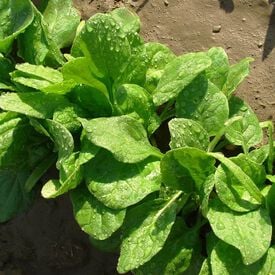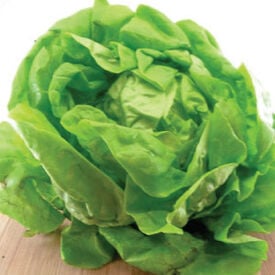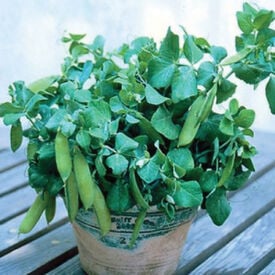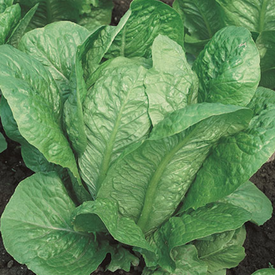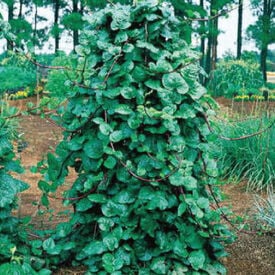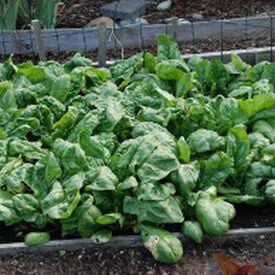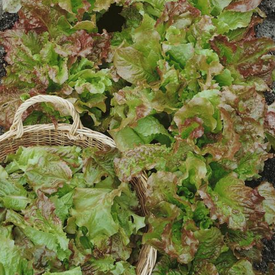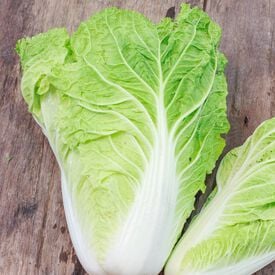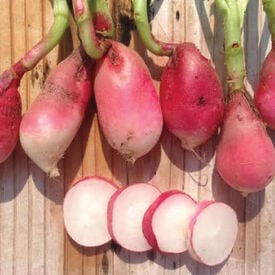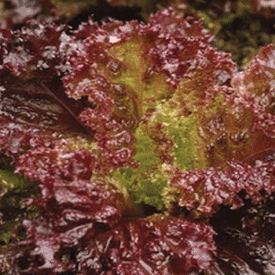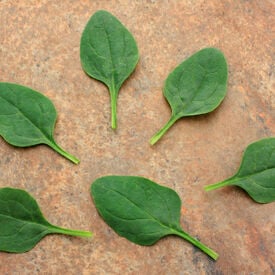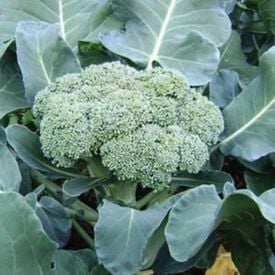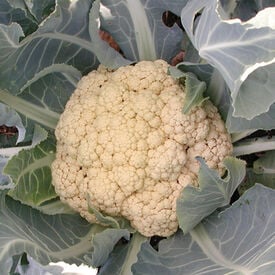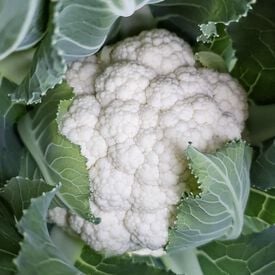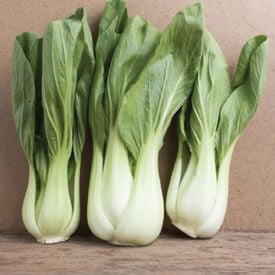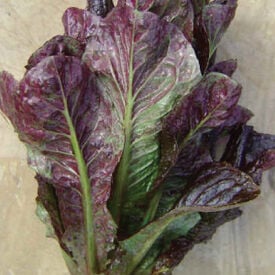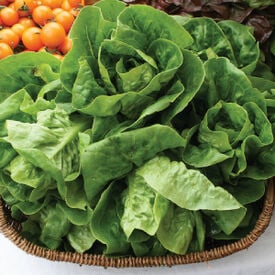The Viroflay Spinach is a gourmet French heirloom that was developed prior to 1866. The big, smooth leaves of this Spinach variety is a deep green color and grows up to 10 inches long. This very fast growing plant is popular for fall planting.
Bibb is a crisp, clean, and easy to grow butterhead lettuce that has light green leaves with the occasional red spots. The crispy heads often self blanch in the center. This lettuce variety is perfect for farmers markets and for the home gardener. This Bibb does well in the heat, yet still grows quickly in our cool weather. Lt. John B. Bibb served in the War of 1812, represented Logan County in the Kentucky House of Representatives and the state Senate from 1827 to 1834. Lt. Bibb was also an amateur horticulturist and developed the Bibb lettuce we know and love today. However, it wasn't offered commercially until 1935.
Just like its name, the Tom Thumb Pea is a tiny bush pea plant perfect for containers! If you are hurting for space but want to grow some delicious peas, try the Tom Thumb! This pea variety produces pea pods on a tiny pea plant.
The Vivian lettuce is a tightly bunched romaine with broad dark green crisp leaves. Its leaves are 12-16 in. long and 4-6 in. across. Vivian is bolt resistant and suitable for commercial and home growers. Its erect dark green leaves are great for baby leaf production.
Red Malabar spinach (Basella rubra) is a heat-loving, vining green that thrives through the hottest days of summer when traditional greens fade. This vigorous Asian vine features glossy, thick, slightly savoyed dark green leaves set against striking deep red to purple stems, making it as ornamental as it is edible. The mild, chard-like flavor works well when young leaves and tender stems are used fresh in salads, blended into smoothies, or lightly cooked in stir-fries. Exceptionally tolerant of heat and humidity, it produces an abundance of nutritious greens well into fall, along with deep purple berries rich in anthocyanins that can be used as a natural dye. Not a true spinach, this beautiful plant is typically grown as an annual in cooler regions and as a perennial in subtropical climates, but it is not frost hardy.
The Olympia is a top-notch smooth leaf hybrid spinach that has a great flavor. This spinach Hybrid has thick and dark green leaves that grow upright. The Olympia is highly recommended for spring, summer, fall and over wintering crops because it resists bolting under high temperatures and long day conditions. Treated seed.
The Santa Fe Lettuce produces a small blanched head that is surrounded by green outer leaves with a tinged bronze-red tip. This variety is a favorite for being extra crunchy!
Michihili cabbage is great for those who love stir-fry or pickling cabbage. A tight-head type with well blanched, crisp and tender interior. Michihili produces a cylindrical, leafy head. A high yielding cabbage with excellent flavor. Chinese cabbage nutrients include vitamins A and C.
The French Breakfast Radish has a delicate flavor and is an excellent variety for home gardens. This radish variety is an attractive uniquely shaped radish with elongated roots and red tops with white tips. The French Breakfast has an excellent flavor and texture, that is perfect for dips or as a garnish.
Lolla Rossa lettuce is a beautiful Italian heirloom variety originating from the Lolla region near Bergamo, known for its striking deep-red, frilly leaves and crisp texture. Typically forming compact, loose-leaf rosettes about 6 to 8 inches across, it adds vibrant color and visual appeal to salads and garden beds alike. The leaves are tender yet slightly crunchy, offering a mild, slightly bitter flavor with a subtle nutty finish. Lolla Rossa thrives in cool weather and prefers full sun with well-drained, fertile soil rich in organic matter. It grows best in temperatures between 45–70°F and benefits from consistent moisture, making it ideal for spring and fall planting.
Riverside is a smooth spinach with dark green leaves. Grown mostly for its spade-shaped baby leaf harvesting. Riverside produces at normal rates with an upright plant habit. Excellent for growers who want premium quality product. Riverside is also very resistant to downy mildew.
Calabrese Green Sprouting broccoli is a popular and nutritious vegetable known for its tender florets and robust flavor. Originating from Italy, specifically the Calabria region, this variety was cultivated for centuries before gaining popularity worldwide, especially in home gardens and markets. Calabrese broccoli include its sturdy, upright stalks and large, vibrant green heads that typically form in loose clusters. The color is a rich, dark green, with tightly packed florets that can range from small to medium-sized. When cooked, Calabrese broccoli offers a slightly sweet and earthy flavor, making it a versatile ingredient in a variety of dishes, from stir-fries to soups. An appealing attribute of Calabrese is its ability to produce side shoots after the main head is harvested, providing multiple harvests throughout the season. This variety is also valued for its nutritional benefits, being rich in vitamins C and K, fiber, and antioxidants. Its hardiness and adaptability make Calabrese green sprouting broccoli a favorite among gardeners and cooks alike.
The Snow Crown cauliflower is a delicious, mild and sweet hybrid. This cauliflower's head will get to 7-8 inches across and 1-2 pounds. The Snow Crown is extra early and adaptable and can be harvested in summer or fall. Be careful not to under-fertilize or water, stress can cause a purplish discoloration on the undersides of the head.
Snowball Y Improved cauliflower is a popular open pollinated variety! This cauliflower is known for its vigorous, rapid growth and long harvest. Its head is snow-white and measures 7-8" inches across. Give this cauliflower fertile soil, full sun and steady moisture and you'll be rewarded with large, delicious heads that are high in vitamin C.
White Stem Pak Choi, also known as Bok Choy or Pak Choi, is a versatile and popular Asian cabbage variety with origins in China. This leafy green vegetable has been cultivated for centuries, appreciated for its tender leaves and crisp, white stems. Characterized by its vibrant green, broad leaves and smooth, white stalks, White Stem Pak Choi is both visually appealing and nutritious. The flavor is mild and slightly sweet, making it a popular choice in stir-fries, soups, and salads. Harvesting typically occurs 45-60 days after planting, when the plants reach a height of about 12-18 inches, and can be done by cutting the entire plant or picking individual leaves. White Stem Pak Choi thrives in cooler weather, preferring well-drained soil and full sun, making it suitable for spring and fall planting. Its rapid growth and ability to produce multiple harvests, combined with its rich content of vitamins A, C, and K, make it a favorite among gardeners and cooks alike. Overall, White Stem Pak Choi is valued for its crisp texture, mild flavor, and adaptability in a variety of dishes.
The Red Russian Kale is a very tender, colorful specialty kale for salad mix and bunching. This variety is a special, refined strain. Its stems are purple and leaves are deep gray-green with purple veins. This flat, noncurled, and tooth-edged kale has a wonderful taste. Red Russian matures medium-tall and leaves are tender compared to other kales.
Red Romaine Lettuce has long, crinkled leaves with great crunch! This variety starts green and fades to redish-purple. The Red Romaine's leaves are12" tall and the plant is about 10-12" wide. This lettuce is often used in Caesar salads not only for its crunch, but also for its color. Use Red Romaine lettuce for an incredible edible purple border in your flower beds.
Little Gem lettuce is a small, compact variety that belongs to the Romaine family. Known for its tender, crisp leaves and sweet, mild flavor, it has become a favorite in both casual and fine dining. The heads are typically about the size of a fist, with tightly packed, bright green leaves that are both crunchy and delicate. Its flavor is a perfect balance between the slightly bitter taste of Romaine and the mild sweetness of Butterhead lettuce. Little Gem is often used in salads, sandwiches, or as a base for grilling, where its natural sweetness intensifies. Its small size also makes it an ideal choice for individual servings or garnishes. Rich in vitamins A, C, and K, it’s not only flavorful but also nutritious. Little Gem's heads are about 4 inches across and are prime eating from 4-6 inches tall. The plants can be spaced 6 1/2 by 6 1/2 inches for maximum yields. Growing Little Gem lettuce is relatively easy and well-suited to home gardeners, thriving in cool, temperate climates. This compact variety of lettuce prefers full sun but can tolerate partial shade, especially in hotter weather. It grows best in well-drained, fertile soil with a slightly acidic to neutral pH. To plant, sow seeds directly into the soil in early spring or late summer, spacing them about 6-8 inches apart to allow for proper air circulation and growth. Little Gem lettuce thrives with regular watering, but it’s important to avoid waterlogging, as this can lead to root rot. As it matures, the small heads form tight, crisp rosettes. Harvesting can begin in around 30-45 days, typically when the heads are firm but still small. For continuous harvest, sow new seeds every couple of weeks. Little Gem lettuce is also ideal for container gardening due to its compact size, making it a great choice for small spaces or urban gardens.
